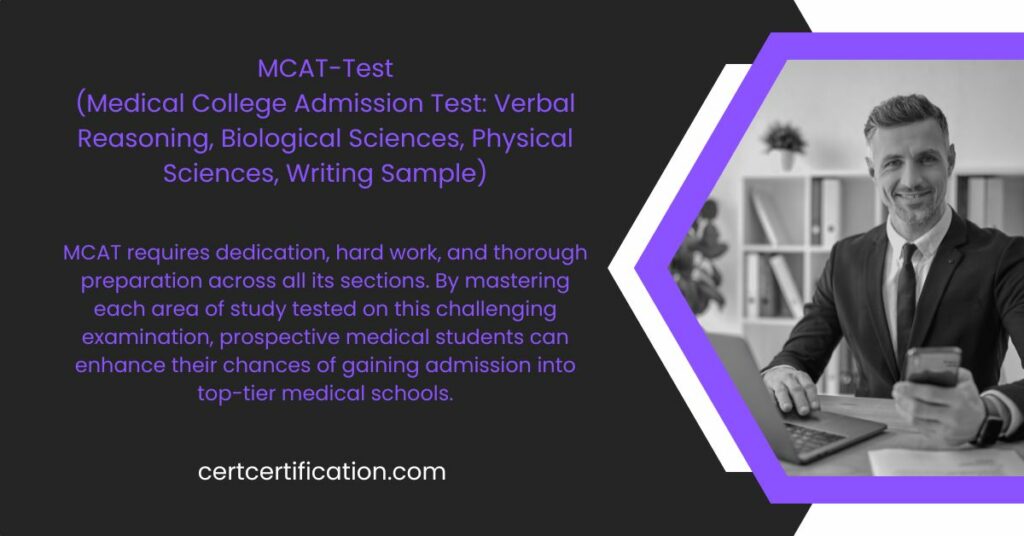Introduction
Are you dreaming of becoming a doctor and pursuing your passion for medicine? Well, before you can don that white coat and stethoscope, there's one hurdle you must overcome: the Medical College Admission Test (MCAT). This standardized test is a crucial step in your journey to medical school. It assesses your knowledge and skills in various areas, from verbal reasoning to biological sciences. In this blog post, we'll dive into what exactly is on the MCAT, how to prepare for it effectively, and ultimately increase your chances of success. So grab a cup of coffee and let's get started on this exciting adventure towards acing the MCAT!
What is on the MCAT-Test (Medical College Admission Test)?
The Medical College Admission Test, or MCAT, is a standardized exam administered to individuals seeking admission into medical school. It consists of four main sections: Verbal Reasoning, Biological Sciences, Physical Sciences, and the Writing Sample.
In the Verbal Reasoning section, test-takers are assessed on their ability to read and comprehend complex passages. This section evaluates their critical thinking skills and understanding of written material.
The Biological Sciences section focuses on topics such as biology, biochemistry, organic chemistry, and general chemistry. It tests the examinee's knowledge in these areas and their ability to apply scientific principles.
The Physical Sciences section assesses a candidate's understanding of physics concepts as well as general chemistry principles. It requires problem-solving skills and an understanding of mathematical relationships.
The Writing Sample section measures the examinee's ability to communicate effectively through writing. Test-takers are presented with two essay prompts and must construct coherent arguments within a specified time frame.
Preparing for the MCAT involves extensive studying and practice. It is crucial for aspiring medical students to review content from undergraduate courses while also familiarizing themselves with test-taking strategies specific to each section of the exam.
Success on the MCAT requires dedication, hard work, and thorough preparation across all its sections. By mastering each area of study tested on this challenging examination, prospective medical students can enhance their chances of gaining admission into top-tier medical schools!

How to Prepare for the MCAT-Test (Medical College Admission Test)?
Preparing for the MCAT can be a daunting task, but with the right approach and strategies, you can set yourself up for success. Here are some tips to help you prepare effectively for this challenging exam.
1. Start Early: The key to success on the MCAT is starting your preparation early. This will give you enough time to cover all the necessary topics and review them thoroughly.
2. Understand the Format: Familiarize yourself with the format of the exam by reviewing sample questions and practice tests. This will help you get accustomed to the types of questions asked and improve your time management skills.
3. Create a Study Schedule: Plan out your study schedule in advance, allocating specific times for each subject area. Be sure to include regular breaks to avoid burnout.
4. Utilize Available Resources: Take advantage of study materials such as textbooks, online resources, and prep courses specifically designed for the MCAT. These resources can provide valuable insights into test-taking strategies and offer additional practice material.
5. Practice Regularly: Consistent practice is key when preparing for any standardized test like the MCAT-Test . Set aside dedicated study sessions where you work through practice questions and full-length exams under timed conditions.
6. Stay Focused & Motivated: It's important to stay focused throughout your preparation period - eliminate distractions, create a conducive study environment ,and find ways to keep yourself motivated along this challenging journey.
Remember that everyone has their own unique way of studying so experiment with different techniques until you find what works best for you!
Conclusion
In this blog post, we have discussed the Test Prep Medical College Admission Test (MCAT) and its various sections. The MCAT is a crucial exam for aspiring medical students, as it assesses their knowledge and skills in Verbal Reasoning, Biological Sciences, Physical Sciences, and Writing Sample.
The Verbal Reasoning section evaluates a student's ability to critically analyze written passages. It tests their comprehension skills and logical reasoning abilities. To prepare for this section, practice reading complex texts and answering questions about them.
The Biological Sciences section focuses on biology-related topics such as anatomy, genetics, physiology, and biochemistry. This part of the MCAT requires a strong understanding of these subjects along with critical thinking skills. To succeed here, review key concepts from your science courses and take practice exams to familiarize yourself with the format.
The Physical Sciences section covers physics and general chemistry topics like mechanics, thermodynamics, atomic structure, chemical reactions, etc. Prepare by reviewing fundamental principles in these subjects and practicing solving problems related to them.
Lastly,the Writing Sample section assesses your ability to communicate effectively through writing. You will be given two prompts requiring you to write an essay expressing your thoughts coherently within a limited time frame.
To excel in this area,it is essential to work on improving your writing skills by practicing structuring essays,demonstrating clear arguments,and refining grammar,vocabulary,and sentence construction.
To prepare for the MCAT effectively:
1. Start early: Give yourself enough time before the exam date so that you can cover all the necessary content.
2. Create a study schedule: Break down your preparation into manageable chunks of study sessions.
3. Utilize resources: Invest in good prep books or online courses that align with your learning style.
4. Practice regularly: Take practice tests under timed conditions to simulate real exam scenarios.
5. Seek help when needed: If you are struggling with certain concepts or sections of the test,reach out to tutors or study groups for assistance.
Comments (0)